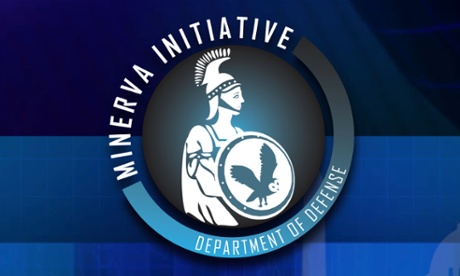Facebook Denies Emotion Contagion Study Had Government and Military Ties
MEDIA, WHISTLEBLOWING - SURVEILLANCE, 7 Jul 2014
Researchers say the study was not funded by Minerva Research Initiative, which engaged scientists in national security issues.

The Facebook ’emotion contagion’ study does not have ties with the US DoD’s Minerva Research Initiative, according to Facebook and Cornell.
Facebook and Cornell researchers have denied that the controversial “emotion contagion” experiment was funded by the US Department of Defence (DoD).
The social network told the Guardian that the study was entirely self-funded and that Facebook is categorically not a willing participant in the DoD’s Minerva Research Initiative, which funds research into the modelling of dynamics, risks and tipping points for large-scale civil unrest across the world, under the supervision of various US military agencies.
“While Prof Hancock, like many researchers, has conducted work funded by the federal government during his career, at no time did Professor Hancock or his postdoctoral associate Jamie Guillory request or receive outside funding to support their work on this PNAS paper,” John Carberry, director of media relations at Cornell University where the academic work took place, told the Guardian.
“Initial wording in an article and press releases generated by Cornell University that indicated outside funding sources was an unfortunate error missed during the editorial review process.”
Several publications alleged that because one of the key academic researchers on the study, Professor Jeffrey Hancock at Cornell, previously had ties with the Minerva Initiative that the Facebook “emotion contagion” work could have been in service of the US military.
Determine the tipping point of social contagions
The Minerva initiative was launched in 2008, the year of the global banking crisis, and was established to allow the department to partner with universities “to improve DoD’s basic understanding of the social, cultural, behavioural, and political forces that shape regions of the world of strategic importance to the US”.
Cornell University is one of the institutions actively engaged with the Minerva Initiative and currently has a study funded through till 2017 managed by the US Air Force Office of Scientific Research which aims to develop an empirical model “of the dynamics of social movement mobilisation and contagions”.
The project aims to determine “the critical mass (tipping point)” of social contagions by studying their “digital traces” in the cases of “the 2011 Egyptian revolution, the 2011 Russian Duma elections, the 2012 Nigerian fuel subsidy crisis and the 2013 Gazi park protests in Turkey.”
Cornell denies that the Facebook “emotion contagion” study that appeared in the Proceedings of the National Academy of Sciences was linked with this project.
At no time did Hancock seek federal funding for this work
“Prof Hancock did submit a research grant proposal to the DoD’s Minerva program in 2008 to study language use in support of US efforts to engage social scientists on national security issues, but that proposal was not funded,” explained Carberry.
“A similar research project was funded in 2009 by the National Science Foundation. Neither project involved studying emotional contagion or Facebook in any way.”
“At no time prior to his work on this paper did Prof Hancock seek federal funding for this work, or any work studying emotional contagion on Facebook,” insisted Carberry.
Other US universities including Washington and Maryland are involved in studies directly funded and commissioned by Minerva and the DoD, while the US military also has its own in-house research institutions conducting further studies and projects.
Facebook did not want to provide a comment for publication.
The row over the ethical implications of the Facebook “emotion contagion” study still rumbles on, despite a public apology for the “poorly communicated” study by the social network’s chief operating officer and number two, Sheryl Sandberg.
Her apology contrasted with comments made on the same day by Facebook’s head of global policy Monika Bickert, who defended the study and explained that it was necessary for innovation. She added that legislation which could limit innovation was “concerning”.
- Facebook faces UK inquiry from data protection watchdog over emotion study
- If Facebook can mess with our emotions and make us vote, what else can it do?
Go to Original – theguardian.com
DISCLAIMER: The statements, views and opinions expressed in pieces republished here are solely those of the authors and do not necessarily represent those of TMS. In accordance with title 17 U.S.C. section 107, this material is distributed without profit to those who have expressed a prior interest in receiving the included information for research and educational purposes. TMS has no affiliation whatsoever with the originator of this article nor is TMS endorsed or sponsored by the originator. “GO TO ORIGINAL” links are provided as a convenience to our readers and allow for verification of authenticity. However, as originating pages are often updated by their originating host sites, the versions posted may not match the versions our readers view when clicking the “GO TO ORIGINAL” links. This site contains copyrighted material the use of which has not always been specifically authorized by the copyright owner. We are making such material available in our efforts to advance understanding of environmental, political, human rights, economic, democracy, scientific, and social justice issues, etc. We believe this constitutes a ‘fair use’ of any such copyrighted material as provided for in section 107 of the US Copyright Law. In accordance with Title 17 U.S.C. Section 107, the material on this site is distributed without profit to those who have expressed a prior interest in receiving the included information for research and educational purposes. For more information go to: http://www.law.cornell.edu/uscode/17/107.shtml. If you wish to use copyrighted material from this site for purposes of your own that go beyond ‘fair use’, you must obtain permission from the copyright owner.
Read more
Click here to go to the current weekly digest or pick another article:
MEDIA:
- The Media Navigator (2025)
- Zuckerberg and Musk Have Shown that Big Tech Doesn’t Care about Facts
- BBC Middle East Editor Collaborated with CIA, Mossad
WHISTLEBLOWING - SURVEILLANCE: